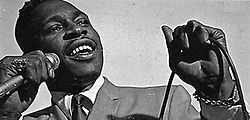Darrell Banks
| Darrell Banks | |
|---|---|
 | |
| Background information | |
| Birth name | Darrell Eubanks |
| Born |
July 25, 1937 Mansfield, Ohio, United States |
| Died |
February 24, 1970 (aged 32) Detroit, Michigan, United States |
| Genres | Soul, Northern soul |
| Occupation(s) | Singer |
| Years active | –1970 |
| Labels | Stax, Atco, Atlantic |
Darrell Banks (born Darrell Eubanks, July 25, 1937 – February 24, 1970) was an American soul singer.
Born in Mansfield, Ohio, Banks grew up in Buffalo, New York, and learned to sing in gospel churches before choosing a career in secular music. He signed with Solid Hitbound Productions/Revilot Records, who released his 1966 single "Open the Door to Your Heart" (which, curiously, is legally named "Baby Walk Right In"), written by Donnie Elbert.[1] When the single came out, Banks was credited as the songwriter instead of Elbert, and a protracted legal battle ensued; however, while the courts settled the matter (eventually in Elbert's favor), the tune scaled the US charts, peaking at #2 R&B and #27 on the Billboard Hot 100.[2] A second single, "Somebody (Somewhere) Needs You", hit #34 R&B and #55 pop later that year.[2] Moving to Atco Records, he released the singles "Here Come the Tears"/"I've Got That Feelin" and "Angel Baby (Don't Ever Leave Me)"/"Look into the Eyes of a Fool" in 1967, neither of which charted. Atco also released a full-length of his which included his Revilot singles. Atco subsidiary Cotillion Records released his last single under the Atlantic Records umbrella, "I Wanna Go Home"/"The Love of My Woman".
From there Banks signed to Stax Records, who released another full-length album of his in 1969 material and two more noncharting singles. They would be Banks's last recordings; in February 1970, Banks was shot and killed by policeman Aaron Bullock in Detroit, Michigan after Banks intervened in his affair with Banks's girlfriend, Marjorie Bozeman.[1]
In December 2014 collectors were bidding in excess of £11,000 for copy of "Open the Door to Your Heart", a week before the end of its auction online The London Records pressing of the record was thought to be the only copy in circulation. It had previously been thought that all the original versions had been destroyed when rival label EMI won the rights to release the single.[3]
Discography
- Darrell Banks Is Here! (Atco Records, 1967)
- Darrell Is Here to Stay (Stax Records, 1969)
- The Lost Soul (compilation, 1997)
References
External links
|